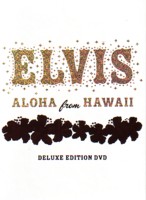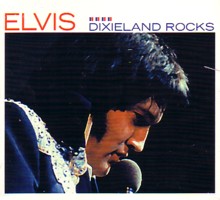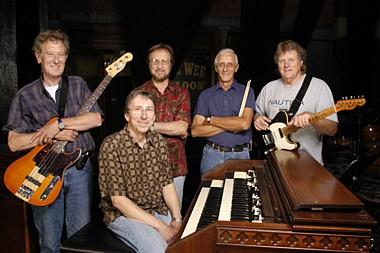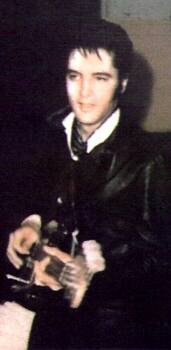'From Elvis To Garth'
Bobby Wood - & The Memphis Boys
- An EIN Spotlight by Pamela Mays Decker -
|
Extraordinarily the 40th anniversary of Elvis' pivotal recordings at American Studios sessions has essentially passed without so much as a whimper.
EIN contributor Pamela Mays Decker turns a much-needed spotlight on Bobby Wood, keyboardist and a musical inspiration behind these important Memphis sessions.
The Memphis Boys, as the studio group, with their natural abilities and dedication cranked out some great sounds which resulted in 122 hits emerging from the studio – a feat yet unmatched.
(Right: Bobby Wood, Mike Leech, Gene Chrisman and Elvis) |
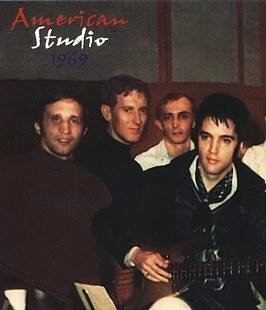 |
Mississippi farm boy, Gospel aficionado, solo artist, songwriter, collaborator with Nashville A-list stars, member of the most successful studio group in history – and very soon, published author. Throughout his remarkable life, Memphis Boys keyboardist Bobby Wood has worn many hats in the music world. Fortunately for fans, he will soon release a book in which he candidly discusses his faith, family, frailties and his phenomenal career spanning six decades that has found him working with a range of prominent stars "from Elvis to Garth" and just about everyone in between.
Born in 1941 and raised on a farm at Mitchell Switch, a community just south of New Albany, Mississippi – just 20 miles and six years from where and when Elvis came into the world – Wood was one of six children in a musical family that delighted crowds as the Wood Family Gospel Group. He recalls that it was his grandfather Walter Wood’s passion for music that inspired his heirs’ musicality. After studying classical music through mail-order lessons, the elder Wood decided that genre wasn’t for him. He then mastered and went on to train others in the American folk music tradition of shape notes.
In rural areas of the American South and Appalachia, the shape note method of teaching and singing is tightly woven into the deeply traditional culture. From the 1800s to mid 1900s, the classes were often a rare opportunity for people to learn music and practice the vibrant, dramatic harmonies and strong rhythm of congregational singing. The roots of most Southern Gospel quartets and performers sprang from this more than 200-year-old tradition (shape note singing experienced a resurgence in popularity after being featured in the 2003 motion picture "Cold Mountain" – the soundtrack of which garnered worldwide acclaim).
Wood’s grandfather taught the seven-syllable "do re mi" system to countless children in communities he reached by horse-drawn buggy and the $2 tuition was paid sometimes with baskets of vegetables. After completing several days of lessons, the musically-enriched children gathered to perform a concert for an audience of proud parents.
Beginning in 1948, Bobby’s father Leslie hosted the Pap Wood’s Gospel Radio Hour and the Singing Convention of the Air, beaming the sounds of praise to the northeast Mississippi masses on Tupelo’s WELO. Before long, the show – featuring singers brandishing their Stamps Baxter and Vaughn shape note songbooks – was broadcast remotely from the Union County courthouse. Each child in the Wood household (Maxine, Irene, Etoye, Billy, Bobby and Jamie) sang and mastered an instrument.
For Bobby, the organ was his forte. From years of singing with his family, he developed amazing vocal abilities. Already an accomplished musician by his late teens, he set forth on Bankhead Highway to Memphis after high school graduation. It was there in the burgeoning Soul capital of the universe where he became Sun Studio producer Stan Kesler’s protégé. Kesler is known best as the man responsible for the formation of the two most successful studio groups of all time: Dixie Flyers and the Memphis Boys.
In 1964, Bobby released a song on Joy Records – "If I’m a Fool (For Loving You)" – penned by his mentor. The single became a hit. Among the song’s many fans was none other than the Presley paterfamilias, Vernon.
With a promising future as a solo artist, the handsome young singer’s plans were violently derailed by severe injuries from a tragic car accident that almost claimed his life while touring in Ohio to promote his breakthrough single. After enduring several agonizing surgeries and months of recovery from his painful, debilitating injuries, he is quick to this day to credit his strong, abiding Christian faith for not only getting him through those struggles, but for guiding him to the next level of his career. |
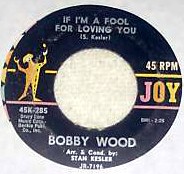 |
But what lay ahead was far beyond anything he could have ever visualized in his wildest dreams or asked for in his humblest prayers. As Wood is quick to share, "The Lord has really blessed me." And to music fans, those blessings wrap our world in an array of sounds that stir our very souls and deeply touch our hearts. The devastation that would have easily turned a man of weaker character toward a life wracked with torturous self-pity and brooding echoes of "what might have been" was indeed conversely the genesis of a new phase of success for the very grounded and resolute Bobby Wood. The stability of studio session work better suited his needs, so he became Sun’s staff piano player. But it would be his motorcycle riding buddy from another Memphis studio who would soon offer the opportunity not only to make records, but also to set records.
American Studio’s Memphis Boys
Wood met ace guitarist, Rockabilly veteran and soon to be iconic producer Lincoln "Chips" Moman, a Georgia transplant to the Bluff City, in 1962 while he was still manning the board across town at Stax Studios. After an acrimonious split from Jim Stewart and Estelle Axton over their failure to properly credit and fairly compensate him for his role in the studio’s successes, Moman embarked with Don Crews on a venture that would attract some of the industry’s most prominent and beloved performers as well as turn raw talent into hot international acts.
The unrivaled success of American Studios was a phenomenal combination of Moman’s uncanny abilities as a sharp, plainspoken producer, the poignant product of his assembly of talented, expressive songwriters… and the seamless sounds of the rhythm section comprised of a half-dozen Southern music men who moved the earth in a way the region hadn’t experienced since the New Madrid Fault Line temblors that caused the Mississippi River to flow backward some 155 years earlier.
In addition to Wood on keyboards, the Memphis Boys were rounded out by Reggie Young on lead guitar, Bobby Emmons on organ and keyboards, Tommy Cogbill and Mike Leech on bass and Gene Chrisman on drums.
With the utter ease of an autonomic bodily function, this talented smattering of country boys spewed forth the funky, signature Memphis mixture of Soul and Country – a sound as rich and gritty as the delta soil beneath their feet and as murky, rhythmic and rollicking as the muddy river that snaked southward at the edge of town just blocks away. |
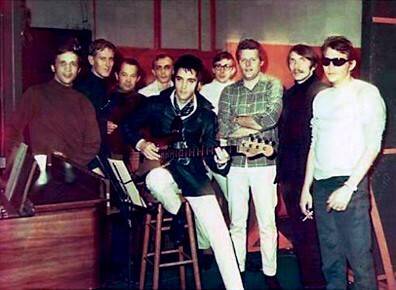 |
(Above:Bobby Wood, Mike Leech, Tommy Cogbill, Gene Chrisman, Elvis, Bobby Emmons,
Reggie Young, Ed Kollis & composer Dan Penn.)
Together, their natural abilities and dedication to cranking out some great sounds resulted in 122 hits emerging from the studio at Chelsea and Thomas from 1967 to 1971 – a feat yet unmatched. To this day, the strong bond of brotherhood they forged more than 43 years ago remains unyielding.
Of all the successful artists fortunate to have been backed by the Memphis Boys over the years – including Dusty Springfield, Neil Diamond, Wilson Pickett, The Box Tops, B.J. Thomas, the Sweet Inspirations, Dionne Warwick, Paul Revere and The Raiders, Merrilee Rush, Sandy Posey, Billy Swan, Joe Tex, Herbie Mann, James and Bobby Purify and countless others (gracing four separate charts in the process) – they are most proud of their role in helping usher Elvis back to chart-topping prominence during their January-February 1969 collaboration that served as his creative rebirth.
But that wasn’t Bobby Wood’s first meeting with Elvis. Around the time "That’s All Right Mama" was released, the Wood family was recording demos at Sun. Sam Phillips introduced the Union County boy to the young man from Lee County – who no one could have possibly fathomed at the time was about to change music history and turn popular culture on its ear. A few years later, Elvis invited him and the future Mrs. Wood to one of his infamous overnight excursions at the fairgrounds.
Beyond the obvious connection in their rural upbringing in neighboring counties, Wood and Presley felt a kinship. They shared a deep Christian faith, love of spiritual music and they were both intimately acquainted with hard work and hard times. Elvis often spoke in somber tones of how his mother kept him on the straight-and-narrow. His loss left an abyss of loneliness – and Wood knew he was reaching out, seeking a deeper friendship from his fellow Mississippian. In his forthcoming book, he relates many touching stories about their initial meeting, subsequent friendship and his recollections of several personal experiences with Elvis’ generosity – many of which he has never before shared publicly.
| Many fans have read about the tremendous honor Wood received when Elvis recorded the song that had been such a hit for Wood. He recalls, "He brought Vernon with him (to American) one evening, and Elvis said, ‘Daddy, I'd like you to meet somebody here.’ He brought him over to shake my hand and he said, ‘Do you know who this guy is?’ Vernon said, ‘No, I'm not sure.’ So Elvis asked him, ‘What's your favorite record?’ Vernon said, "If I'm a Fool." Elvis told him, ‘Well, this is the guy who sang it.’ And his dad just said, ‘Whoa!’" |
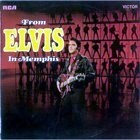 |
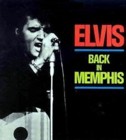 |
On February 20, 1969, after a long night of recording with standouts such as "It Keeps Right On a Hurtin’" and "Any Day Now," he and Wood were sitting at the piano, talking about spirituality and music around 4:30 a.m. Everyone else in the studio was tired and there were few remaining numbers on their song list. It was then that Elvis recorded "If I’m a Fool (For Loving You)" – and even played the piano – because it was his father’s favorite song.
Wood observes that one other entertainer with whom he has worked for the past 20 years shares the same generous spirit Elvis displayed. "Garth Brooks is like that," he said. "He’d give you the shirt off his back. If he knows people are hurting, he’d do anything for them. He’s a lot like Elvis in that respect." In his memoir, he draws interesting parallels between the wellsprings of talent both those superstars were blessed with. From his unique – and to some, quite enviable perspective, he delightfully shares numerous heart-warming personal recollections of his work with so many beloved acts. As he is quick to self-effacingly demur, it is a position he is lucky to have. From a fan’s viewpoint however, one could argue that conversely, they were the lucky ones to have worked with a man like Bobby Wood.
Many times, Elvis told Wood that he was his favorite piano player, and he even asked him on several occasions to join him on tour. He felt conflicted. His friendship with Elvis was important, but he also had a very busy studio recording schedule that he felt he needed to concentrate on. While Elvis fans surely would have enjoyed Wood onstage during Elvis’ blockbuster concerts, music lovers at large would have missed out on the pure magic that Wood helped make on the many records since the late 1960’s/early 1970’s that speak for themselves. (Right;Elvis and Bobby Wood at American Studio)
American Studios wasn’t the only time he worked with Elvis. In addition to the two successful albums and four hit singles generated from those early 1969 sessions, his work with Elvis is featured on other releases. The album "Elvis Now" was released in January 1972, but actually featured some songs from the American sessions. He worked with Elvis again in Memphis during his July and December 1973 sessions at STAX Studios, and the results appear on "Raised On Rock" (released in October 1973) and "Good Times" (released in March 1974).
|
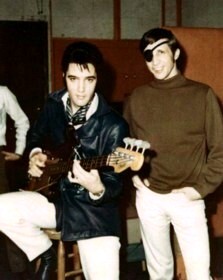 |
A devastating event that occurred across town on a hotel balcony at 450 Mulberry Street on April 4, 1968 not only stunned the world, but it also dealt a stultifying blow to R&B music as it had been played within the studios of Muscle Shoals, Alabama and in Memphis up until then. Beyond that point, the feeling was different – with a thick, stifling tension hanging in the air like a negative vibe.
For decades, the impoverished and working-class throughout the rural agrarian South labored side by side in fields, sharing the same oppressive lot whether they were of Scots-Irish, Native American, African or other descent. The work was backbreaking… the living was hard… and toiling shoulder-to-shoulder, skin color was of little to no significance. No one had either the time or the condition to pass judgment. Under the hot sun’s glare, laborers sang to pass the time and ease their burdened bodies and souls. As Wood recounts, "There was great singing in those cotton fields. Everybody worked hard."
Bonds of friendship were shared – as was the sorrow, pain, joy and exaltation of their shared God. By stark contrast, the media images viewed by the rest of the world did not show this side of Southern living, but instead shaped long-standing, narrow perceptions that all white Southerners were seething racists. Those heavily circulated images did not accurately or fairly reflect the unity that was pervasive in so many areas.
It was from that sense of hardscrabble concomitance that emerged the shapings of mid-century popular music through the melding of traditionally "white" music and traditionally "black" music. In the 1950’s and 1960’s studios of Muscle Shoals and Memphis, Caucasians and African Americans worked as equal players, just as they had done together in the fields under the boiling Southern sun. The resulting sounds reflected the tightly intermeshed culture, faith and sense of unity that existed between so many of all races. (Further adding to that musical menagerie – a veritable Mulligan stew of cultures, it was an atheist Jew from New York City named Jerry Wexler of Atlantic Records who would be instrumental in the wide distribution of this sound to the masses during this time.) These facts may very well fly in the face of some long-held perceptions of life in the American South. But those who lived it know it well.
| Dr. Martin Luther King, Jr.’s assassination deeply affected African American artists – and the devastating crescendo of tension that ensued in Memphis and resonated everywhere beyond drove a wedge among the racially diverse R&B champions who had together worked harmoniously for so long. There was no way to turn back the clock. The brotherhood… the mixing and melding… was permanently altered. It is profoundly ironic that the soul that Wood proudly reflects "was born in Memphis" was altered permanently by the shattering events in Memphis in spring 1968. It wasn’t very long until all the American Studios players made a reluctant, heart-wrenching mass exodus from Memphis to begin the next stage of their careers in another Tennessee city some 210 miles due east. |
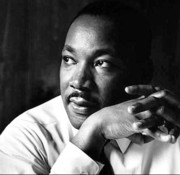 |
Nashville, Memphis-Style
In the early 1970s, Wood was invited to Nashville by Elvis’ Blue Moon Boys guitarist Scotty Moore as well as by all-around Music City mogul Buddy Killen. Then, he invited fellow American Studios alum Johnny Christopher (who wrote "Mama Liked The Roses" and co-wrote "Always On My Mind") to join him. Before long, the Memphis Boys were doing their thing in Nashville – and often on projects with their American Studios producer Chips Moman – for stars such as Willie Nelson, B.J. Thomas, Johnny Cash, Ronnie Milsap, Merle Haggard, Kris Kristofferson, Billy Joe Royal, Waylon Jennings, Tammy Wynette and a parade of Country and Pop luminaries while they still cut sides with the occasional R&B star. While their careers resumed in middle Tennessee, there is no doubt they had taken their Memphis-born magic with them as another stream of #1 and Top 20 hits poured from their efforts.
It was during this time Wood put pen to paper to begin songwriting, which he said was inspired by another American Studios brother-in-arms, R&B master Dan Penn (see photo above). In 1974, Billy "Crash" Craddock covered his "Still Thinkin' About You," taking it to #4 on the Country charts. Since then, he has written or co-written many tunes such as Andrea True Connection’s 1978 Top 10 Billboard Hot Dance Music/Club Play hit, "What's Your Name, What's Your Number" (co-written with Roger Cook), Crystal Gayle’s Top 20 Pop and Country hits "Talkin' In Your Sleep" and "Half the Way" and Ronnie Milsap’s 20th #1 Country and Adult Contemporary chart hit "He Got You" (co-written with Ralph Murphy) among many others.
| By the end of the 1980’s, a mutual friend introduced Wood to Garth Brooks, and thus emerged yet another longstanding musical partnership and close friendship. Wood has played keyboards on all of Brooks’ recordings – and in February 1998, the Country megastar and his future wife Trisha Yearwood won a Best Country Collaboration with Vocals Grammy for their #1 hit duet, "In Another's Eyes," co-written by Brooks, Bobby Wood and John Peppard. The song, from Brooks’ RIAA-certified Diamond album "Sevens" (as well as Yearwood’s #1 album "Songbook: A Collection of Hits") also received a Grammy nomination for Best Country Song. When the Memphis Boys were one of six inaugural groups inducted into the Musicians Hall of Fame in 2007, Brooks introduced them with his deferential observation, "There's very few records an artist makes, but there are a hell of a lot of records musicians make." |
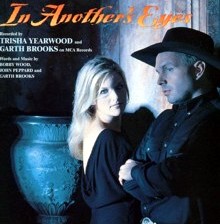 |
Making his mark in Memphis and continuing with 36 years of success in Nashville, the Gospel-bred Bobby Wood has played on some of the most vital R&B, Pop and Country records ever released – even making a foray into Disco and Jazz. Looking back on a lifetime of music, this north Mississippi boy remains a genuine soul, ever close to his spiritual roots that have guided him on a fascinating ride through music history. He may have Nashville dirt beneath him, but the heart of a musical Memphian beats inside him.
And this gentle spirit is quick to express his appreciation of the fans – sharing that as the 40th anniversary of those landmark sessions with Elvis have come and gone, the group has often reflected upon their time in the studio with him. Approaching five decades after they first came together, they not only remain very busy as highly sought-after working studio musicians, but most importantly, the Memphis Boys remain true friends; a clan of musical brothers, of sorts. Of the many accolades showered upon Wood and the entire crew from that funky studio at 827 Thomas Street, it is their strong, deep bond of true friendship that is no doubt their greatest gift and proudest accomplishment.
Long content with his role of helping some of music’s biggest stars sound great, this gracious, humble man steps forward with plenty to say about his trials, triumphs and the grace that has long guided his path. Bobby Wood’s forthcoming book will surely be an eagerly anticipated must-read not only for Elvis fans, but certainly for ardent fans of all music the world over – and anyone who seeks to be inspired. A survivor in the truest sense, Wood is a walking miracle whose gifts and contributions go so much deeper than his musical talents. The words of this man who overcame great suffering to achieve even greater success truly touch and uplift the spirit.
The expected release of Wood’s memoir (the title yet to be announced, but definitely subtitled "From Elvis to Garth") is slated for later this year, with no firm date as of yet. As more news develops, updates will follow.
Psalms 150:4: "Praise him with the tambourine and choir! Praise him with stringed instruments and the organ!"
Click here to comment on this article
Spotlight by Pamela Mays Decker.
-Copyright EIN May 2009. © 2009 Pamela Mays Decker. Do Not reprint or republish without permission.
Do not miss this fascinating Pamela Decker spotlight on Elvis at American Studios - The Turning Point
Pamela Mays Decker is a writer from Birmingham, Alabama. A lifelong Elvis fan, she parlayed her love for music into a seven-year stint as a radio personality. In the past two decades, she has worked as a newspaper reporter, advertising manager, magazine writer, voice-over talent, comedy ghostwriter and in various marketing and executive capacities in Corporate America with a lot of slimy people she didn’t like. Currently, she is focusing on individual freelance projects, including a book about Memphis history.
Is 'From Elvis In Memphis' the only Elvis album you need to own?: July 1969….. man walked on the moon and Elvis Presley's new album 'From Elvis In Memphis' hit the US charts. Both events would prove to be monumental, albeit in different ways.
"At the very end of the sixties Elvis recorded the one Elvis Presley album everyone should own if they’re only going to own one" .. ... writes on-line A.V Club's Kenneth Partridge.
Released in June 1969, six months after NBC aired what’s become known as the ’68 Comeback Special, From Elvis In Memphis was Presley’s real return to form. It contains everything that was ever great about the King Of Rock ’N’ Roll.
So, is 'From Elvis In Memphis' the only Elvis Presley album you need to own?
Go here where EIN adds their own thoughts and revisits this incredible album.
(Spotlight; Source;A.V Club/ElvisInfoNet) |
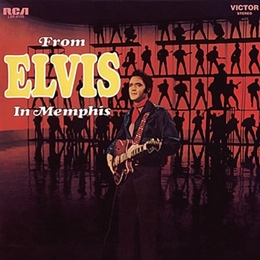 |
'American Studios - A Turning Point In History': Elvis' pivotal recordings at American Studios in January and February 1969 were a key turning point, not just in Elvis' amazing legacy but also in music history. Extraordinarily the 40th anniversary of Elvis' American Studios sessions has essentially passed without so much as a whimper. There is no sign marking the site where these landmark sessions took place. There has also been no media focus commemorating the string of hits generated from Elvis’ all too brief Memphis convergence with legendary producer Lincoln Wayne "Chips" Moman and the talented musicians assembled in his studio. EPE has not even acknowledged the recording or release dates of these chart topping songs. EIN recently noted the 40th Anniversary of the first chart topping song from these sessions 'In The Ghetto' and now EIN contributor Pamela Mays Decker turns a much-needed spotlight onto these unique Memphis sessions. Click here for this fascinating spotlight.
(Spotlight, Source;EIN/PamDecker) |
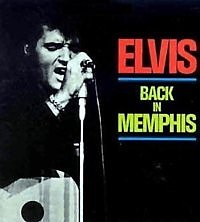 |
Memphis Boys' Bobby Emmons Dies: Bobby Emmons, a Nashville songwriter who also played an integral role in the Memphis studio scene for decades, passed away Monday, February 23rd 2015, in a Nashville hospital following an undisclosed illness. He was 72.
Born in Corinth, Mississippi, Emmons began his career as a member of the famed Bill Black Combo and played keyboards in the original house band at Hi Records studios, before joining the American Studios crew formed by producer "Chips" Moman. That celebrated group also featured guitarist Reggie Young, drummer Gene Chrisman, pianist Bobby Wood, and bassists Mike Leech and Tommy Cogbill. The group backed Elvis on his life-changing '69 Memphis Sessions as well as Dusty Springfield's 'Son of a Preacher Man' and Neil Diamond's 'Sweet Caroline'. Between 1962 and 1972, they played on more than 100 chart hits.
Emmons' piano and organ playing also featured on recordings by Wilson Pickett, Garth Brooks, Townes Van Zandt and Roy Orbison. As a songwriter, he had cuts by the likes of George Strait ("So Much Like My Dad"), Waylon Jennings ("Women Do Know How to Carry On") and Tanya Tucker ("Love Me Like You Used To"). |
 |
In December 2014, Emmons was part of legendary Memphis singer-songwriter Dan Penn's band when he appeared on The Late Show with David Letterman for a performance of 'The Dark End of the Street' which was written by Penn with Chips Moman.
(News, Source;ElvisInfoNet) |
|
|



